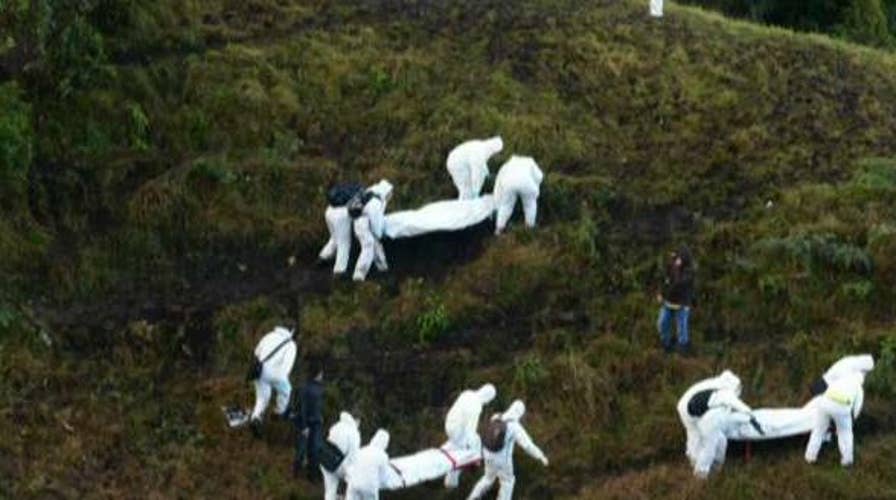Seventy-one of the 77 passengers aboard a plane carrying a Brazilian soccer team were killed Tuesday when the aircraft crashed while on its way to the finals of a regional tournament, authorities in Colombia said.
Officials initially said that 81 people were on board the chartered British Aerospace 146 short-haul plane. However, authorities said late Tuesday that four people listed on the plane's manifest did not actually board the flight in Santa Cruz, Bolivia.
The aircraft, operated by LaMia, declared an emergency at 10 p.m. Monday because of an electrical failure, aviation officials said. The plane was carrying the Chapecoense soccer team to Medellin, Colombia.
The southern Brazilian squad was set to play Wednesday in the first of a two-game Copa Sudamericana final against Atletico Nacional of Medellin. The tournament features some of the top soccer teams in South America.
"It's a tragedy of huge proportions," Medellin Mayor Federico Gutierrez told Blu Radio, later adding: “What was supposed to be a celebration has turned into a tragedy.”
The soccer club said in a statement posted on Facebook that "may God accompany our athletes, officials, journalists and other guests traveling with our delegation."
Alfredo Bocanegra, the head of Colombia's aviation authority, said initial reports suggest the aircraft was suffering electrical problems although investigators were also looking into an account from one of the survivors that the plane had run out of fuel about 5 minutes from its expected landing at Jose Maria Cordova Airport outside Medellin.
A video published on the team's Facebook page showed the team readying for the flight earlier Monday in Sao Paulo's Guarulhos international airport.
Bolivia's civil aviation agency said the aircraft picked up the Brazilian team in Santa Cruz, where players had arrived earlier in the day on a commercial flight from Sao Paulo. Spokesman Cesar Torrico said the plane underwent an inspection before departing for Colombia and reported no problems.
Brazil as well as South America's soccer federation extended its condolences to the entire Chapecoense community and said its president, Alejandro Dominguez, was on his way to Medellin. All soccer activities were suspended until further notice, the organization said in a statement.
Elkin Ospina, mayor of La Ceja, near where the crash took place, said rescuers working through the night had been heartened after pulling three passengers alive from the wreckage.
Authorities and rescuers were immediately activated but an air force helicopter had to turn back because of low visibility. Heavy rainfall complicated the nighttime search, and authorities urged journalists to stay off the roads so ambulances and other rescuers could reach the site.
Images broadcast on local television showed three passengers on stretchers and connected to an IV arriving at a hospital in ambulances. Among the survivors, Chapecoense defender Alan Ruschel was in the most serious condition, and was later transported to another facility to undergo surgery for a spinal fracture. His teammates Helio Zampier and Jakson Follmann also suffered multiple trauma injuries, hospital officials said. A journalist traveling with the team was recovering from surgery and two Bolivian crew members who survived were in stable condition.
Local radio said the same aircraft transported Argentina's national squad for a match earlier this month in Brazil, and previously had transported Venezuela's national team.
"This morning I said goodbye to them and they told me they were going after the dream, turning that dream into reality," a Chapecoense board member told TV Globo. "The dream was over early this morning."
The team, from the small city of Chapeco, was in the middle of a fairy tale season. Rising through the ranks of Brazil's soccer leagues, it joined the country's top division in 2014 for the first time since the 1970s and made it last week to the Copa Sudamericana finals after defeating two of Argentina's fiercest squads, San Lorenzo and Independiente, as well as Colombia's Junior.
The team is so modest that its 22,000-seat arena was ruled by tournament organizers too small to host the final match, which was instead moved to a stadium 300 miles to the north in the city of Curitiba.
"Chapecoense was the biggest source of happiness in the town," the club's vice-president, Ivan Tozzo, told Brazil's SporTV. "Many in the town are crying."
The Associated Press contributed to this report.

